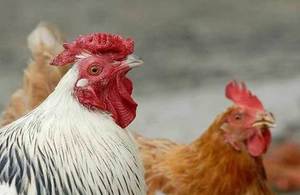Avian influenza (bird flu) found in wild birds in England and Scotland
H5N8 strain of the disease found in two dead wild wigeons in England

Bird flu
Read avian influenza (bird flu) in winter 2016 to 2017 or avian influenza (bird flu) detailed guidance for the latest information.
The UK’s Chief Veterinary Officer has confirmed two wild birds in England have tested positive for H5N8 strain of Avian Influenza.
The two confirmed findings in dead wild wigeons from Somerset and Leicestershire follow confirmation of H5N8 in a dead wild peregrine falcon in Scotland today, and the finding of the same strain in a dead wild wigeon in Wales yesterday.
This is the same strain which has been circulating in mainland Europe and which was found at a poultry farm in Lincolnshire last week, although there is no suggestion the disease has spread from that farm.
The advice from Public Health England (PHE) remains that the risk to public health from the virus is very low. Advice regarding contact with wild birds remains the same; to make sure you wash your hands thoroughly with soap after coming into contact with any animal and to not touch any sick or dead birds. The Food Standards Agency has made it clear that bird flu does not pose a food safety risk for UK consumers. Thoroughly cooked poultry and poultry products, including eggs, are safe to eat.
Chief Veterinary Officer Nigel Gibbens said:
Today’s confirmed findings mean that avian flu has now been found in wild birds in widely separated parts of England, Wales and Scotland.
This is far from unexpected and reflects our risk assessments and the measures we have taken including introducing a housing order for poultry and a ban on gatherings. We’ll continue to work with ornithological groups to further strengthen surveillance and our understanding of the extent of infection in wild birds.
The risk to kept birds cannot be eliminated by housing alone. This virus can be carried into buildings on people and things to infect birds. Good biosecurity measures are essential. We also need people to continue to report findings of dead wild birds so that we can investigate.
It is important to reiterate Public Health England’s advice that the risk to public health is very low and the Food Standards Agency is clear that bird flu does not pose a food safety risk for UK consumers.
The Government continues to closely monitor the situation in Europe and has implemented a series of other measures to limit the threat of spread to poultry. These include the declaration of a Prevention Zone on 6 December, requiring all kept birds to be housed or otherwise kept separate from wild birds, and a temporary ban on poultry gatherings announced earlier this week.
Members of the public are encouraged to report dead wild waterfowl (swans, geese or ducks), or other dead wild birds such as gulls or birds of prey, to the Defra helpline on 03459 33 55 77.
Any further findings of Avian Flu in wild birds will be published online.
Background
The Prevention Zone remains in place across Great Britain. All poultry and/or captive birds must be housed where practicable and owners must take all appropriate steps to ensure that:
-
Poultry and other captive birds are provided with feed and water which is not accessible to wild birds;
-
Any person who comes into contact with poultry and other captive birds must take all reasonable precautions to avoid the transfer of contamination between premises, including cleansing and disinfection of equipment, vehicles and footwear;
-
Steps are taken to reduce the movement of people, vehicles or equipment to and from areas where poultry or captive birds are kept to minimise contamination from manure, slurry and other products;
-
Steps are taken to implement effective vermin control programmes, including preventing the entry of wild birds, around buildings where poultry or captive birds are kept;
-
Housing and equipment is thoroughly cleansed and disinfected at the end of a production cycle;
-
Disinfectant at the right concentration is kept at all points where people should use it, such as farm entrances and before entering poultry housing or enclosures.
Further information on biosecurity and how to prevent disease.
A case of avian flu was confirmed on a farm in East Lindsey, Lincolnshire on December 16.
A finding in a wild wigeon in Llanelli, Wales was confirmed on December 22.
The ban on gatherings of chickens, turkeys, ducks and geese applies in England, Scotland and Wales.
If you are concerned about the health of your birds you should seek advice from your veterinary surgeon. If you suspect that your birds are showing signs of the disease you should immediately report it to your local Animal and Plant Health Agency (APHA) office.
Poultry keepers, including those with fewer than 50 birds, are encouraged to provide details of their flocks to the Poultry Register. This will ensure they can be contacted immediately in the event of an avian disease outbreak so that they can take action to protect their flock at the earliest opportunity.
Defra helpline for reporting dead wild birds: 03459 33 55 77.
For media enquiries the Defra press office on 020 8225 7618.